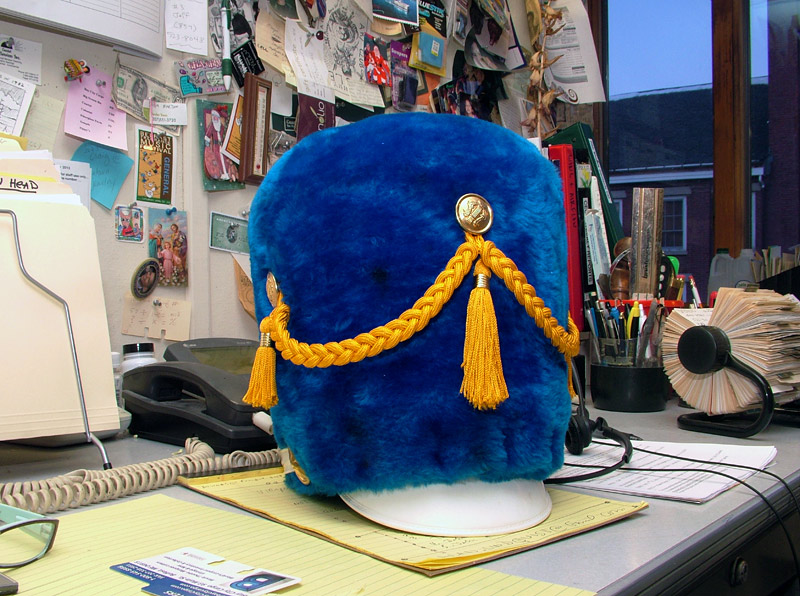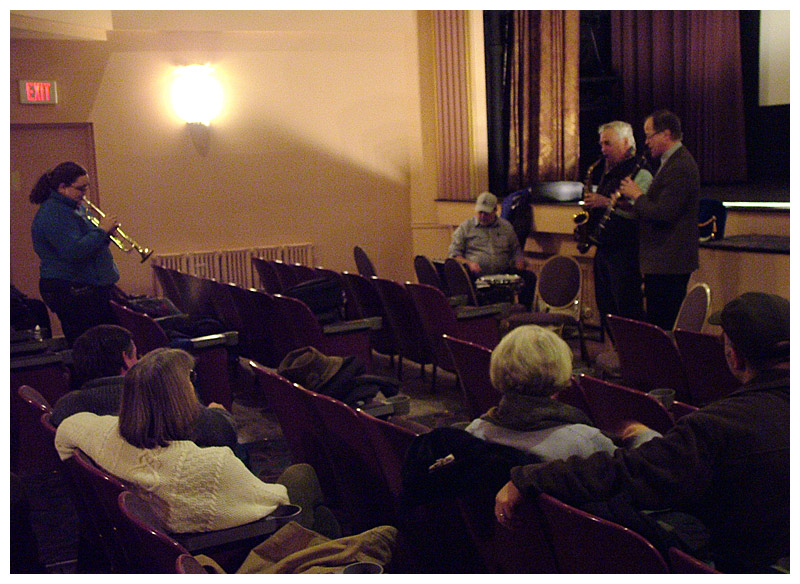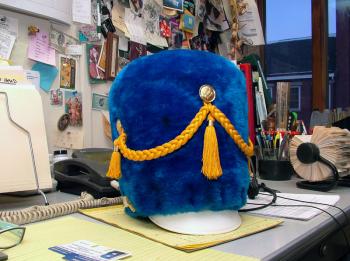Belfast’s unnamed marching band takes a first step
 A vintage Belfast Area High School marching band hat in the downtown office of Mike Hurley. The longtime city booster is hoping to spark local interest in an activist marching band, like those featured at the annual Honk! festival. (Photo by Ethan Andrews)
A vintage Belfast Area High School marching band hat in the downtown office of Mike Hurley. The longtime city booster is hoping to spark local interest in an activist marching band, like those featured at the annual Honk! festival. (Photo by Ethan Andrews)
 Several musicians, including Maylinda Boynton, standing, left, Alan Crichton and Dan Kirchoff test the waters on the new band idea. Others pictured did not bring instruments to the informational meeting at the Colonial Theatre, Monday night. (Photo by Ethan Andrews)
Several musicians, including Maylinda Boynton, standing, left, Alan Crichton and Dan Kirchoff test the waters on the new band idea. Others pictured did not bring instruments to the informational meeting at the Colonial Theatre, Monday night. (Photo by Ethan Andrews)
 A vintage Belfast Area High School marching band hat in the downtown office of Mike Hurley. The longtime city booster is hoping to spark local interest in an activist marching band, like those featured at the annual Honk! festival. (Photo by Ethan Andrews)
A vintage Belfast Area High School marching band hat in the downtown office of Mike Hurley. The longtime city booster is hoping to spark local interest in an activist marching band, like those featured at the annual Honk! festival. (Photo by Ethan Andrews)
 Several musicians, including Maylinda Boynton, standing, left, Alan Crichton and Dan Kirchoff test the waters on the new band idea. Others pictured did not bring instruments to the informational meeting at the Colonial Theatre, Monday night. (Photo by Ethan Andrews)
Several musicians, including Maylinda Boynton, standing, left, Alan Crichton and Dan Kirchoff test the waters on the new band idea. Others pictured did not bring instruments to the informational meeting at the Colonial Theatre, Monday night. (Photo by Ethan Andrews)
BELFAST - The Colonial Theatre was officially closed, but in the old cinema in the rear of the building, a dozen people stared up at the big screen. Still images of awkward-looking high school bands appeared, accompanied by the familiar warble of brass instruments played under duress, and a printed question:
“Did you have fun playing music?”
There were chuckles from the seats. In the style certain of TV commercials, the audience was getting a look at the notoriously bad product before the unveiling of its revolutionary replacement.
The hook came several slides later, when the music suddenly switched gears. It was groovy and so too was the look of the performers who flashed across the screen: a group of poker-faced Rastafarians; a huddle of college misfits in twee mustaches and vests.There were baton twirlers, umbrella-toting second liners. The bands had members of all ages and most featured equal numbers of women and men.
Mike Hurley, who put together the presentation last week, used the term “activist marching bands.” For several years, he’s been asking if there could be one in Belfast. The meeting at the Colonial was the culmination of months of promotion — an open call to anyone interested in the “Un-named Belfast Maine street band project.”
“I love these bands, but I’m not a musician,” Hurley told the group, many of whom were getting their first exposure to the music.
Activist marching bands borrow their instrumentation from traditional marching bands but trade the stilted fanfares and military drills for percussion-driven grooves, energetic melodies and a presentation that can be informal, flamboyantly theatrical, and occasionally, militant.
The current wave of groups dates back 15 to 20 years, and has approached critical mass in the last decade. Hurley first heard of the movement several years ago when NPR did a piece on Honk! festival, an annual gathering in Somerville, Mass. dedicated to new variations on the marching band theme. His reaction was typical of many coming across the music for the first time. He was blown away.
“I always loved that big sound,” he said. “Obviously, everybody does. That’s why they’re in parades.”
The subversion of the traditional brass band structure is nothing new. Horns and drums from European military bands have been adapted to traditional folk music forms in colonial outposts around the world. The instrumentation is portable and loud, making it ideal for parades, parties and protests. Often bands took root under the radar of authority, and sometimes in open opposition to it.
The bands that converge on the Honk! Festival embody a similar spirit, whether it’s the punk ethos of nonconformity, or the do-it-yourself spirit that is upside of poverty. In the spirit of a guerilla movement, they often take their audiences by surprise. Shows are advertised by word of mouth. And because the bands are mobile, the party doesn’t always stay put.
Hurley made the pilgrimage to Honk! last year. He recalled arriving at a venue for one performance only to find one of drummers, a hulking man in a gorilla mask, insisting that the band wasn’t going to play there. He led the crowd to a nearby parking garage where the rest of the band was waiting.
“It was nuts in there,” he said. “The sound was incredible.”
Hurley is not totally new to the marching band scene. A decade ago, after attending the Halloween Parade in New York City, he snatched up some cheap marching band drums on eBay and started the Drum and Rabble. The semi-organized percussion mob that has become a mainstay of Belfast’s New Year’s by the Bay event.
The Belfast Free Range Music Festival, for which Hurley is one of a handful of organizers, included a performance by the What Cheer? Brigade — the band that played in the parking garage — in 2012.
Those who came to the open call at the Colonial last week ranged from seasoned multi-instrumentalists to once-upon-a-time school band players. One claimed a “questionable background” in a university marching band. Another had played in other kinds of bands but expressed more interest in choreography and costuming.
There was a couple from Appleton with the last name Horne, and a Belfast Area High School student who had once been told by an instructor that her last name was “Tuba.” It was a compliment.
That was Maylinda Boynton, and though tuba is what she is known for, on this night she brought a trumpet.
“It was the only one that would fit in the car,” she said.
Hurley said later that he had initially hoped for an outpouring of hipsters to get the ball rolling. When he saw the polite group that came to the open call, he wondered if the gonzo antics of the bands on screen would be too much.
Boynton hadn’t seen or heard of activist marching bands before, but like many of the attendants, she seemed unfazed, and even excited about the idea of doing something different.
“It sounds fun,” she said, matter-of-factly.
Dressed in a dark suit jacket and wire rimmed glasses and at least a generation older, Dan Kirchoff looked like he’d arrived from a classical performance. And in fact, his experience has been in traditional settings, from orchestra pits to polka bands. But it was the the idea of doing something new that appealed to him.
“I like the idea that it’s not very formal,” he said. “I remember in high school and college it was like, ‘Get that drum. Stand like this. Walk sideways.’”
As he spoke, he acted out the commands with exaggerated rigor.
“This is more like theater,” he said, flashing a mischievous smile.
Gil LaCroix, who came from Bucksport to hear more about the new street band, summed up his experience as: 50 years behind a rock and roll drum kit. The last 20 had been with a group called Sunset Strip, playing weddings and other events.
LaCroix said he had always been a fan of second line drumming, but with the exception of the occasional Little Feat cover, he didn’t get to do much of it. Asked about the newer marching bands, he shrugged.
“It’s a more modern iteration of the same thing,” he said.
LaCroix had a snare drum in his car, and several other attendants brought out instruments after the presentation to test the waters.
On the way out, Kirchoff was upbeat. “I think it’s the kind of thing a lot of people could get behind,” he said.
The next day in his office, Hurley talked through a bunch of scenarios. For the most part, he would have to wait and see, but he was cautiously optimistic.
”I think there’s enough of a seed there. If we can start with even four or five people, that’s pretty amazing,” he said “I think we take it one step at a time,”
For more information about the band, visit the Belfast Maine Un-named Street Band Project page on Facebook.
Ethan Andrews can be reached at news@penbaypilot.com
Event Date
Address
United States




























